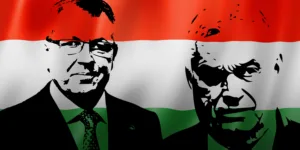As Indonesia looks to develop its first nuclear power plant in collaboration with Russia’s Rosatom, President Prabowo Subianto faces crucial decisions about the future of this partnership.
Key takeaways:
-
Indonesia and Russia are cooperating to develop Indonesia’s first nuclear power plant.
-
Spotty track record and uncertain future of Rosatom are putting the project under question.
-
Potential US moves against Rosatom and nuclear cooperation with Russia create further uncertainties for Jakarta’s plans.
During his visit to Russia in late July, Indonesian then President-elect Prabowo Subianto and Russian President Vladimir Putin discussed several areas of cooperation. One key area was energy security. Subianto expressed interest in deepening cooperation in the nuclear energy sector, particularly through Indonesia’s existing partnership with Rosatom, Russia’s state-owned nuclear energy corporation. As Indonesia strives to achieve net zero emissions by 2060, this was not the first time it had shown interest in collaborating with Russia on nuclear energy.
In 2015, Rosatom signed a memorandum of understanding with Indonesia’s National Nuclear Energy Agency to develop a safe nuclear power industry in the country. In 2023, an Indonesian delegation visited Russia to explore Rosatom’s capabilities in constructing large-scale and small modular nuclear power plants. In 2024, Rosatom experts visited Indonesia twice to present their experience with small modular reactors and other promising technologies. They also confirmed their readiness to help Indonesia build its first nuclear power plant by 2032, aligning with Indonesia’s National Energy Plan to achieve net-zero goals by 2060.
Given Indonesia’s long-standing non-aligned stance, it is one of many Global South nations that have not imposed sanctions on Russia. Thus, Jakarta has openly pursued deeper cooperation with Moscow, even amid current geopolitical tensions. However, Subianto must consider two key factors before advancing Indonesia’s nuclear energy sector with Russia: Rosatom’s future prospects and a proposed US bill.
Uncertain prospects of Rosatom project
Why would any country want to be a client of Rosatom? Although the EU’s sanctions on Russia over its war on Ukraine do not apply to the company, it has been sanctioned by the United States. Nevertheless, Rosatom remains a major player in the global market, controlling over 17% of reactor fuel production and more than 40% of uranium enrichment. Additionally, Russia has designed around 90 nuclear power units worldwide and holds the second-largest uranium reserves globally.
Rosatom offers attractive services to its clients, including loans and assistance from the Russian government. These services cover design, construction, and staff training. Russian government loans have been used to support projects like Hungary’s Paks II Nuclear Power Plant (over $10 billion) and Egypt’s El-Dabaa Nuclear Power Plant (around $25 billion). However, while these offerings may seem appealing, Indonesia must recognize the long-term dependence these projects create. For instance, Hungary’s Paks II Nuclear Power Plant remains reliant on Russian fuel, which creates geopolitical leverage for the Kremlin.
In other words, partnering with Rosatom could lead to Indonesia’s nuclear power plant becoming fully reliant on Russia. This dependence could be risky, particularly for a country like Indonesia, which prides itself on its non-aligned stance. A shift in global geopolitics could create challenges if Indonesia and Russia find themselves at odds in the future. As demonstrated by Germany’s experience of energy dependence on Russia before the 2022 Ukraine invasion, relying on one country for energy, with no easy options to diversify, can carry significant risks.
Adding to the concern is Russia’s track record with recent investment projects in Indonesia. For instance, in 2023, Zarubezhneft, a Russian state-owned energy company, withdrew from a joint venture to develop the Tuna gas field due to Western sanctions. In July 2024 the state-owned oil company Rosneft asked to renegotiate the deal to build the Tuban oil refinery project in East Java, which had been planned since 2016 in collaboration with Indonesia’s state-owned energy corporation, Pertamina, because of geopolitical uncertainties caused by Russia’s ongoing war in Ukraine. These setbacks should prompt Subianto to consider whether Russia’s economic struggles make it a dependable investor for a critical project like a nuclear power plant.
In March 2024, the Bellona Environmental Foundation reported that Rosatom’s energy output decreased by 2.8% in 2023, from 223.4 billion kWh in 2022 to 217 billion kWh in 2023, due to issues with withdrawing old power plant units. This marked the first drop in output in a decade. Bellona predicts that by 2030, the corporation will focus more on building nuclear power plants in Russia to meet the target of increasing nuclear power generation in the country by 25% by 2045. To achieve this target, Rosatom urgently needs to build new nuclear power plant units in order to replace retired capacities. Failure to do so could lead to a significant decline in Russia’s nuclear capacity by 2035 and nearly halve it by 2045. This shift in focus is expected to reduce Rosatom’s foreign projects by nearly half over the next six years. However, this analysis does not include smaller-scale SMR (small modular reactor) projects.
Kean’s proposed sanctions bill
On May 16, 2024, the US House Foreign Affairs Committee passed the Rosatom Sanctions Enforcement Act, introduced by Europe Subcommittee Chairman Tom Kean, Jr. At the time of writing, the bill was still under consideration by Congress. If passed, the bill would impose sanctions not only on Rosatom, its affiliates, and subsidiaries but also on any foreign individual involved in constructing new Rosatom reactors, as well as anyone aiding or abetting sanctions violations by these entities or individuals.
What are the chances of Indonesian individuals being sanctioned for involvement with Rosatom? It’s too early to tell, but the risk is not negligible. Geopolitics is inherently fluid, and even Subianto himself was banned from entering the United States for nearly two decades over human rights allegations, a ban that was lifted in 2019 when he became defense minister. The prospect of US sanctions already caused Indonesia to reconsider purchasing Russian Sukhoi jets in 2021. Similarly, the US-Indonesia Critical Minerals Specific Free Trade Agreement (CMS-FTA) talks were paused in October 2023, after US senators raised concerns about China’s involvement in Indonesia’s nickel industry. In September 2024, the US Department of Labor also listed Indonesian nickel as a product linked to forced labor, potentially complicating Indonesia’s ambitions to be a major player in the electric vehicle (EV) battery supply chain.
However, even if the bill passes, it does not automatically mean that Indonesian individuals involved with Rosatom would be sanctioned. The United States and Indonesia have partnered on SMRs since 2023. Indonesia’s National Energy Council (DEN) confirmed in June 2024 that the country is developing nuclear energy on Bangka Belitung Island with US-based PT Thorcon Power Indonesia. Sanctioning Indonesians for working with Rosatom could reflect poorly on Washington, given its own involvement in Indonesia’s nuclear development. Moreover, US-Indonesia relations are already somewhat strained, and sanctions would likely worsen them—a move the United States would want to avoid, especially amid its strategic rivalry with China.
Back-up plan
Rosatom’s uncertain future, Kean’s sanctions bill, and the potential for the United States to become Indonesia’s preferred partner in nuclear energy development are critical factors that Subianto must consider moving forward, all while maintaining Indonesia’s hedging strategy between the United States and China.
Fortunately, Indonesia has explored other third-party options, such as Japan or South Korea, for its nuclear energy development. Prioritizing these alternatives could help Subianto navigate the complexities of geopolitical balancing—a key challenge he will face as Indonesia’s new president.






